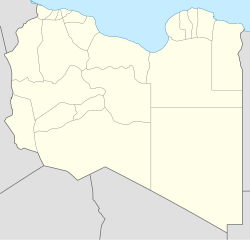RAF Castel Benito: Difference between revisions
removed Category:World War II airfields in Africa; added Category:World War II airfields in Libya using HotCat |
Oldsettler (talk | contribs) No edit summary |
||
| Line 43: | Line 43: | ||
==History== |
==History== |
||
Originally a [[Regia Aeronautica]] (Italian Air Force) airfield where later the first units of Italian parachutists were trained and formed shortly before the [[Second World War]]. The first Italian Military Parachute School was located at Castel Benito. The first troops trained were two Libyan battalions, the [[Libyan Parachute Battalion]] and the 1st [[National Libyan Parachute Battalion]],<ref>http://www.comandosupremo.com/LibyaPara.html</ref> of the [[Royal Colonial Corps]]. |
Originally a [[Regia Aeronautica]] (Italian Air Force) airfield where later the first units of Italian parachutists were trained and formed shortly before the [[Second World War]]. The first Italian Military Parachute School was located at Castel Benito. The first troops trained were two Libyan battalions, the [[Libyan Parachute Battalion]] and the 1st [[National Libyan Parachute Battalion]],<ref>http://www.comandosupremo.com/LibyaPara.html</ref> of the [[Royal Colonial Corps]]. |
||
In 1938 the [[Italian Libya]] governor [[Italo Balbo]] enlarged the military airfield and created an international airport for civilians, served by [[Ala Littoria: the [[Tripoli-Castel Benito Airport]]. |
|||
After it was captured by the British, the airfield was renamed RAF Station Castel Benito and was used by a number of operational squadrons involved in the [[Western Desert Campaign|desert war]], sometimes for only a few days or weeks at a time. |
After it was captured by the British, the airfield was renamed RAF Station Castel Benito and was used by a number of operational squadrons involved in the [[Western Desert Campaign|desert war]], sometimes for only a few days or weeks at a time. |
||
Revision as of 20:39, 17 October 2014
This article needs additional citations for verification. (February 2013) |
RAF Idris | |
|---|---|
| Summary | |
| Owner/Operator | Desert Air Force |
| Location | Near: Tripoli, Libya |
| Built | 1938 |
| Coordinates | 32°40′10″N 013°09′24″E / 32.66944°N 13.15667°E |
| Map | |
RAF Castel Benito (later RAF Idris) was a Royal Air Force station near Tripoli in Libya between 1943 and 1966.
History
Originally a Regia Aeronautica (Italian Air Force) airfield where later the first units of Italian parachutists were trained and formed shortly before the Second World War. The first Italian Military Parachute School was located at Castel Benito. The first troops trained were two Libyan battalions, the Libyan Parachute Battalion and the 1st National Libyan Parachute Battalion,[1] of the Royal Colonial Corps.
In 1938 the Italian Libya governor Italo Balbo enlarged the military airfield and created an international airport for civilians, served by [[Ala Littoria: the Tripoli-Castel Benito Airport.
After it was captured by the British, the airfield was renamed RAF Station Castel Benito and was used by a number of operational squadrons involved in the desert war, sometimes for only a few days or weeks at a time.
In 1952, the station was renamed RAF Idris in honour of the Libyan King Idris at the request of the Libyan government. The station was used as a staging post for flights to and from the United Kingdom to the Middle East and Far East. It was also used in the 1950s as a base for aircraft using the Libyan desert bombing ranges (Tahuna) for practice. The station was closed in the late 1960s when the Libya became a republic.
Following the withdrawal of the RAF from Libya, the airfield became Tripoli Idris Airport. It is now known as Tripoli International Airport.
Units and aircraft
See also
References
Citations
Bibliography
- Jefford, Wing Commander C.G., MBE,BA,RAF (Retd). RAF Squadrons, a Comprehensive Record of the Movement and Equipment of all RAF Squadrons and their Antecedents since 1912. Shrewsbury, Shropshire, UK: Airlife Publishing, 1988. ISBN 1-84037-141-2.
- Sturtivant, Ray, ISO and John Hamlin. RAF Flying Training And Support Units since 1912. Tonbridge, Kent, UK: Air-Britain (Historians) Ltd., 2007. ISBN 0-85130-365-X.


